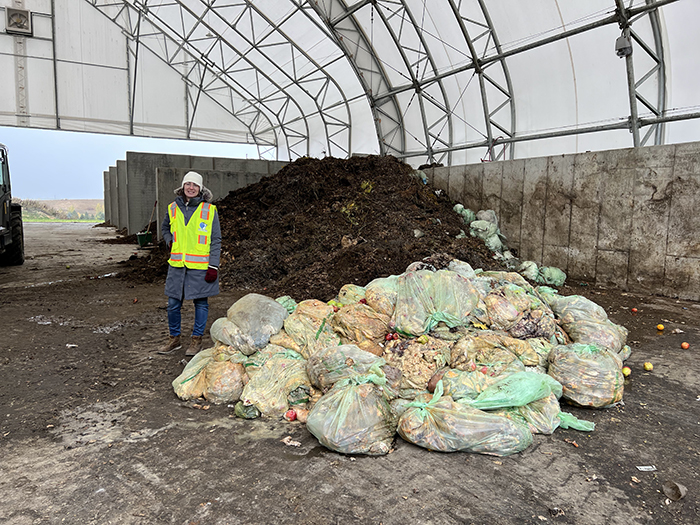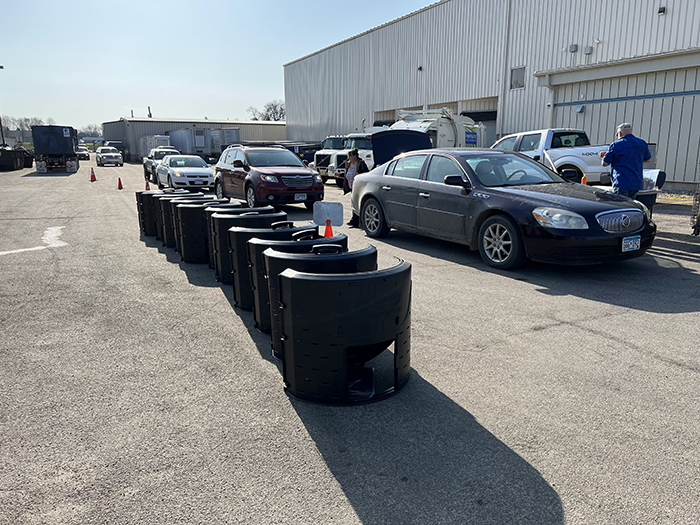Composting program makes an impact
News | Published on December 9, 2022 at 10:48am EST | Author: Chad Koenen
0Program has collected over 200,000 lbs. of compost

Cedar Walters stands in front of 6,000 lbs. of food waste that was collected at the Glacial Ridge Compost Facility in Otter Tail County.
Two programs started last spring are diverting large amounts of food waste from the landfill.
The Organics Recycling Pilot Program was started for locations that generate a substantial amount of food waste, such as schools, hospitals, healthcare facilities and restaurants. The Backyard Composting Program was started to help individuals and families reduce waste by composting food scraps at home. Since last March these two programs started with the support of grant funds from the Minnesota Pollution Control Agency have kept over 200,000 lbs. of food waste out of the garbage where it doesn’t belong.

An alarming 40 percent of the food people produce in the United States is wasted, and food waste and other compostable organic matter is the largest single category of waste in landfills in the United States. Wasting food wastes the resources that went into producing it such as soil, scarce freshwater resources, fuel used for machinery, processing and transportation, and the human labor that goes into farming and processing food.
In addition to wasting important resources, food waste in landfills produces methane, a potent greenhouse gas. While every effort should be made to reduce food waste in the first place, composting can help recover those resources used to produce food and get it out of the landfill. Nutrient rich compost regenerates the soil—helping to improve its water holding capacity and its ability to grow healthy plant life.
The Organics Recycling Pilot Program serves an initial 22 sites, including schools, healthcare, and restaurants in multiple communities in Otter Tail County. The grant funding supplied carts, bins, compostable bags as well as collection and hauling to the sites to help them separate out food waste from the trash.
Food waste in compostable bags is picked up every week by a local waste hauler, and delivered to a composting facility near Hoffman, Minn. Since March, the program has kept over 170,000 lbs of food waste out of the landfill, and instead turns it into nutrient rich compost. Some larger sites such as Kennedy Secondary School collect up to 1,000 lbs of waste a week for Organics Recycling, while smaller sites range from 200-600 lbs. per week.
Although some people are initially hesitant to try Organics Recycling, it can be as simple as putting food scraps into a green bin instead of the trash. The food waste was in the garbage already, so there isn’t more waste, just one more bin that people can feel good about using. Food waste is contained in compostable bags that are stored in green carts outside to reduce smell and contain the material with less mess.
Fabled Farmer owner Rebecca Lacheur said organics recycling is easy.
“At The Fabled Farmer, we have always made the effort to reduce or compost our food waste and now we have this awesome, convenient option,”she said.
Other restaurant owners in Otter Tail County agree with Lacheur.
“The environmental impact was enough for me to say yes, but there have been other benefits as well. We use fewer garbage bags, change garbages less frequently and are able to monitor our food waste more closely,” Ryan Carlson, Owner of Stella’s Restaurant in Battle Lake.
The Backyard Composting Program targeted waste at the household level and provided bins to approximately 500 Otter Tail County residents who agreed to participate in a year-long composting program. Backyard composting is an easy way to cut household waste by up to 25 percent, and is a meaningful action that preserves resources, builds soil health, and reduces the impacts of climate change. So far participants in the program have kept over 40,000 lbs. of food waste out of the landfill.
“We want to thank everyone who is taking action to get food waste out of the garbage through these programs—your action does matter. If someone asks me how they can recycle more, I tell them to start composting. There is no other single thing you can do to cut your waste so substantially that has so much positive impact,” said Cedar Walters-Public Information and Education Officer, Organics Recycling and Composting Program Coordinator.
These two programs are helping Otter Tail County residents and larger food waste generators like schools, healthcare and restaurants be more sustainable and conserve precious resources for future generations.
For questions about the Backyard Composting Program or the Organics Recycling Pilot Program visit www.ottertailcountymn.us/content-page/organics-recycling/ contact Cedar Walters at cwalters@co.ottertail.mn.us.

